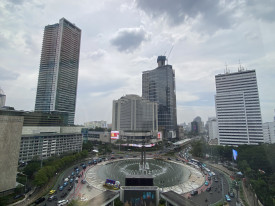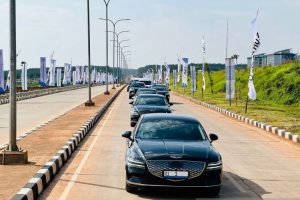Auto industry faces sales slump in 2025 amid EV transition, weak consumer demand
As 2025 unfolds, Indonesia's automotive industry is facing a series of challenges that have led to a decline in domestic four-wheeled vehicle sales, reflecting broader economic and structural shifts within the sector.
According to the Indonesian Automotive Industry Association (Gaikindo), wholesale vehicle deliveries from manufacturers to dealers stood at 61,843 units in early 2025, marking an 11.3 percent decrease year-on-year compared to 69,758 units in the same period last year.
For two consecutive quarters, the Indonesian House of Representatives (DPR) has flagged this sales dip as a warning sign of weakened household consumption and economic uncertainty, especially during this transitional phase toward electric vehicles (EVs).
“This isn’t just a market fluctuation. It’s a combination of weakened purchasing power, global economic uncertainty, and an EV transition that lacks a fully developed ecosystem.” M. Hanif Dhakiri, Deputy Chairman of the House’s Finance Commission XI, said on Thursday, April 24, 2025.
He emphasized that many middle-class consumers are delaying purchases of conventional gasoline vehicles, hoping EV prices will become more affordable soon − particularly with government tax incentives in place.
However, the EV infrastructure in Indonesia still faces major gaps. Public EV charging stations (SPKLU) remain limited, local component use is low, and the technology is largely reliant on imports.
“The transition must not create an economic vacuum. The government cannot act as if the legacy industry can simply be left behind,” Hanif warned.
To support EV adoption, the government offers a 10 percent VAT (value-added tax) reduction for electric vehicles that meet a minimum 40 percent local content requirement (TKDN) or have committed to local assembly investment. Qualifying models, include the Hyundai’s Ioniq 5, BYD’s Seal, and Neta’s X.
In contrast, hybrid vehicles only receive a 3 percent tax incentive, even though hybrids have shown stronger sales performance, thanks to their wider variety and more competitive pricing compared to fully electric vehicles.
As Indonesia pushes forward with its green mobility agenda, balancing the pace of EV adoption with economic realities and infrastructure readiness remains a critical challenge for policymakers and industry stakeholders alike.
Tag
Already have an account? Sign In
-
Start reading
Freemium
-
Monthly Subscription
20% OFF$29.75
$37.19/MonthCancel anytime
This offer is open to all new subscribers!
Subscribe now -
Yearly Subscription
33% OFF$228.13
$340.5/YearCancel anytime
This offer is open to all new subscribers!
Subscribe now







